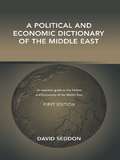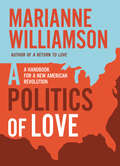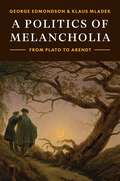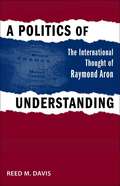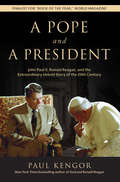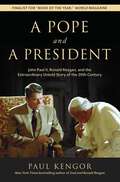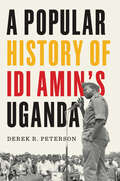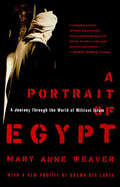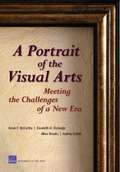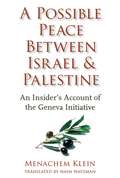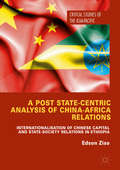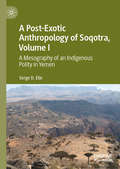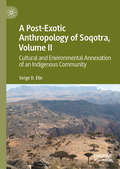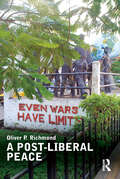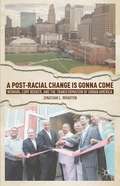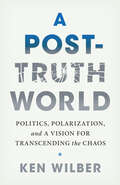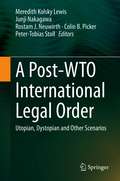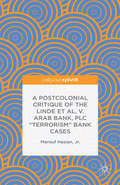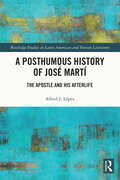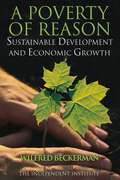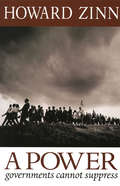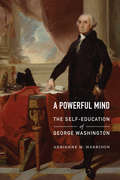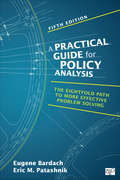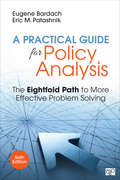- Table View
- List View
A Political and Economic Dictionary of the Middle East
by David SeddonThis reference volume is the definitive guide to the economics and politics of the Middle East. It provides clear definitions detailing terms, concepts, names and organizations used in relation to current economic or political affairs in the Middle East. Entries define, explain and give further relevant information on countries, regions, ethnic groups, political parties, organizations, policies and disputes.
A Politics of Love: A Handbook for a New American Revolution
by Marianne WilliamsonIn this stirring call to arms, the activist, spiritual leader, and New York Times bestselling author of the classic Return to Love confronts the cancerous politics of fear and divisiveness threatening the United States today, urging all spiritually aware Americans to return to—and act out of—our deepest value: love.America’s story is one of great social achievement. From the Abolitionists who fought to outlaw slavery, to the Suffragettes who championed women’s right to vote, to the Civil Rights proponents who battled segregation and institutionalized white supremacy, to the proponents of the women’s movement and gay rights seeking equality for all, citizens for generations have risen up to fulfill the promise of our nation. Over the course of America’s history, these activists have both embodied and enacted the nation’s deepest values.Today, America once again is in turmoil. A spiritual cancer of fear threatens to undo the progress we have achieved. Discord and hatred are dissolving our communal bonds and undermining the spirit of social responsibility—the duty we feel toward one another. In this powerful spiritual manifesto, Marianne Williamson offers a tonic for this cultural malignancy. She urges us to imitate the heroes of our past and live out our deepest spiritual commitment: where some have sown hatred, let us now sow love.Williamson argues that we must do more than respond to external political issues. We must address the deeper, internal causes that have led to this current dysfunction. We need a new, whole-person politics of love that stems not just from the head but from the heart, not just from intellectual understanding but from a genuine affection for one another. By committing to love, we will make a meaningful contribution to the joyful, fierce and disruptive energies that are rising at this critical point in time. In the words of Abraham Lincoln, "we must think anew, and act anew . . . and then we shall save our country."
A Politics of Melancholia: From Plato to Arendt
by George Edmondson Klaus MladekWhy melancholia is a vital form of social critique and a catalyst for political renewalMelancholia is wrongly condemned as a condition of withdrawal and despair that alienates its sufferer from community. Countering that misconception, A Politics of Melancholia reclaims an understanding of melancholia not as an affliction in need of a remedy but as an affirmative stance toward decay and ruination in political life, and restores the melancholic figure—by turns inventive and destructive, outraged and inspired—to their rightful place as the poet of political thought.George Edmondson and Klaus Mladek identify pivotal moments of political melancholia in ancient and modern texts, offering new perspectives on the death of Socrates in Plato&’s dialogues, the fratricide in Hamlet, Woyzeck&’s killing of Marie in Georg Büchner&’s Woyzeck, the murder of Moses in Freud&’s thought, and the betrayal of the revolutionary idea that Hannah Arendt identifies in her critique of eighteenth-century revolutions. Melancholia emerges here as a disposition that is mournful but also jubilant, a mood of unbending disconsolation that remains faithful to a scene of downfall, to events that cannot be forgotten, and to things that cannot be governed.Recovering a tradition of thought that is both affirmative and hopeful, this eloquent book reveals how political melancholia embodies a shared condition of discontent that binds communities together and inspires change.
A Politics of Understanding: The International Thought of Raymond Aron (Political Traditions in Foreign Policy Series)
by Reed M. DavisFrequently hailed as one of the greatest defenders of democratic liberalism in postwar Europe, French philosopher, sociologist, and political commentator Raymond Aron (1905--1983) left behind a staggering amount of published work on a remarkably wide range of topics both scholarly and popular. In A Politics of Understanding, Reed M. Davis assesses the originality and consistency of Aron's body of work, drawing a connection between Aron's philosophy of history and three of his abiding interests: the nature of industrial society, international relations theory, and strategic theory.Davis begins with a brief biography of Aron, known for his skepticism toward political ideologies in the post--World War II era and as an intellectual opponent of Jean-Paul Sartre. After spending three years in Germany in the early 1930s, Aron, a Jew, returned to France in 1933. When war broke out, he fought for a year in the French army and, after the fall of France, escaped to London, where he edited the newspaper of the Free French, La France Libre. He returned to Paris after the war and remained there for the rest of his life, working as a professor and journalist. He wrote an influential political column for Le Figaro for thirty years and authored many books, including The Opium of the Intellectuals (1935), The Algerian Tragedy (1957), and Peace and War (1962).From World War II onward, Davis shows, Aron sought to construct a science of human action that had as its goal charting the way of human progress in light of two fundamental realities, industrialization and the existence of nuclear weapons. Throughout his long career, he continually asked himself whether human life was becoming better as it became more technologically rationalized and more scientifically advanced. In his close analysis of Aron's thought, Davis carefully describes how Aron fused Max Weber's neo-Kantianism with Edmund Husserl's phenomenology to create an original theory of historical knowledge. The central theoretical impulse in all of Aron's works, Davis explains, is that of reconciling freedom and necessity. The ways in which Aron attempted to reconcile these two polarities in his earliest writings had a direct bearing on the manner in which he sought to reconcile realism and idealism in his international thought. By attempting to bring reason and necessity into the same loose orbit, Aron tried to construct a theoretical approach to international relations and statecraft that could hold the middle ground between realism and idealism. Many scholars have simply abandoned efforts to understand the more philosophical dimensions of Aron's thinking because of its technical difficulty. With A Politics of Understanding, Davis provides a concise and clearly written explanation of the basic concepts at work in Aron's philosophy and ties them directly to his later thinking, especially concerning international relations.
A Pope and a President: John Paul II, Ronald Reagan, and the Extraordinary Untold Story of the 20th Century
by Paul KengorIn this fascinating new book, acclaimed scholar and bestselling author Paul Kengor tells the untold story of the partnership between Pope John Paul II and President Ronald Reagan, and how together they changed the course of world history. Kengor shows that the bond between the pope and the president ran deeper than anyone suspected, and that this bond drove the two leaders to confront what they knew to be the great evil of the twentieth century: Soviet communism. Reagan and John Paul almost didn’t have the opportunity to forge this relationship: In the spring of 1981, these world leaders took bullets from would-be assassins—within the span of six weeks. Kengor’s unique access to Reagan insiders and his tireless archival research allows him to reveal previously unknown details, including:The story of the 1982 meeting where the president and the pope confided their conviction that God had spared their lives a year earlier for the purpose of defeating the communist empire.Captivating new information on the attempted assassination of Pope John Paul II, including a heretofore-unreported secret investigation Reagan authorized—was Moscow behind the plot?The many similarities and the spiritual bond between the pope and the president—and how Reagan and a close adviser privately spoke of the “DP”: the Divine Plan to take down communism.New details about how the Protestant Reagan became fascinated by the “secrets of Fatima,” dating to the reported apparition of the Virgin Mary at Fatima, Portugal, starting on May 13, 1917—sixty-four years, to the day, before the attempt on John Paul’s life.An extraordinary insider account of how the Soviet Union may have been preparing to send troops into the pope’s native Poland and impose martial law in March 1981—only to pull back when news broke that Reagan had been shot.Shortly after leaving the White House, Reagan told three men from the Polish Solidarity movement that John Paul II was his “best friend”—a telling indicator of the kinship and supreme objective that united these two towering figures.
A Pope and a President: John Paul II, Ronald Reagan, and the Extraordinary Untold Story of the 20th Century
by Paul KengorEven as historians credit Ronald Reagan and Pope John Paul II with hastening the end of the Cold War, they have failed to recognize the depth or significance of the bond that developed between the two leaders. Acclaimed scholar and bestselling author Paul Kengor changes that. In this fascinating book, he reveals a singular bond—which included a spiritual connection between the Catholic pope and the Protestant president—that drove the two men to confront what they knew to be the great evil of the twentieth century: Soviet communism. Reagan and John Paul II almost didn't have the opportunity to forge this relationship: just six weeks apart in the spring of 1981, they took bullets from would-be assassins. But their strikingly similar near-death experiences brought them close together—to Moscow's dismay.Based on Kengor's tireless archival digging and his unique access to Reagan insiders, A Pope and a President is full of revelations. It takes you inside private meetings between Reagan and John Paul II and into the Oval Office, the Vatican, the CIA, the Kremlin, and many points beyond. Nancy Reagan called John Paul II her husband's "closest friend"; Reagan himself told Polish visitors that the pope was his "best friend." When you read this book, you will understand why. As kindred spirits, Ronald Reagan and John Paul II united in pursuit of a supreme objective—and in doing so they changed history.
A Popular History of Idi Amin's Uganda
by Derek R. PetersonHow Africa’s most notorious tyrant made his oppressive regime seem both necessary and patriotic Idi Amin ruled Uganda between 1971 and 1979, inflicting tremendous violence on the people of the country. How did Amin’s regime survive for eight calamitous years? Drawing on recently uncovered archival material, Derek Peterson reconstructs the political logic of the era, focusing on the ordinary people—civil servants, curators and artists, businesspeople, patriots—who invested their energy and resources in making the government work. Peterson reveals how Amin (1928–2003) led ordinary people to see themselves as front-line soldiers in a global war against imperialism and colonial oppression. They worked tirelessly to ensure that government institutions kept functioning, even as resources dried up and political violence became pervasive. In this case study of how principled, talented, and patriotic people sacrificed themselves in service to a dictator, Peterson provides lessons for our own time.
A Portrait of Egypt: A Journey Through the World of Militant Islam
by Mary Anne WeaverFor centuries Egypt has been a citadel of Islamic learning and thought, and since the signing of the Egyptian-Israeli Peace Treaty in 1979, it has been of immense strategic importance to American interests in the Middle East. But Egypt is also a country in crisis, torn between the old and the new, between unsettled religious revival and secular politics. President Hosni Mubarak favors a secular society. But Mubarak's government faces constant conflict with militant clerics such as Sheikh Omar Abdel-Rahman. In A Portrait of Egypt, Mary Anne Weaver argues that an Islamist victory in Egypt is almost inevitable, and, unlike that of Shi'ite Iran, its impact on the Islamic world will be truly profound.Based on exclusive interviews with militants and front men, generals and presidents, A Portrait of Egypt is essential reading for anyone trying to understand the far-reaching consequences of the growing impact of Islamist politics and policies on the West.
A Portrait of the Visual Arts
by Andras Szanto Arthur Brooks Kevin F. Mccarthy Elizabeth Heneghan OndaatjeThe third in a series that examines the state of the arts in America, this analysis shows, in addition to lines around the block for special exhibits, well-paid superstar artists, flourishing university visual arts programs, and a global expansion of collectors, developments in the visual arts also tell a story of rapid, even seismic change, systemic imbalances, and dislocation.
A Possible Peace Between Israel and Palestine: An Insider's Account of the Geneva Initiative
by Menachem KleinIn 2003, after two years of negotiations, a group of prominent Israelis and Palestinians signed a model peace treaty. The document, popularly called the Geneva Initiative, contained detailed provisions resolving all outstanding issues between Israel and the Palestinian people, including drawing a border between Israel and Palestine, dividing Jerusalem, and determining the status of the Palestinian refugees.The negotiators presented this citizens' initiative to the Israeli and Palestinian peoples and urged them to accept it. One of the Israeli negotiators was Menachem Klein, a political scientist who has written extensively about the Jerusalem issue in the context of peace negotiations. Although the Geneva Initiative was not endorsed by the governments of either side, it became a fundamental term of reference for solving the Middle East conflict. In this firsthand account, Klein explains how and why these groups were able to achieve agreement. He directly addresses the formation of the Israeli and Palestinian teams, how they managed their negotiations, and their communications with both governments. He also discusses the role of third-party facilitators and the strategy behind marketing the Geneva Initiative to the public.A scholar and participant in the Geneva negotiations, Klein is able to provide both an inside perspective and an impartial analysis of the diplomatic efforts behind this historic compromise. He compares the negotiations to previous Israeli-Palestinian talks both formal and informal and the resolution of conflicts in South Africa and Algeria. Klein hopes that by treating the event as a case study we can learn a tremendous amount about the needs and approaches of both parties and the necessary shape peace must take between them.
A Post State-Centric Analysis of China-Africa Relations: Internationalisation of Chinese Capital and State-Society Relations in Ethiopia (Critical Studies of the Asia-Pacific)
by Edson ZisoThis book offers a new alternative to understanding the relationship between China and Africa. Here, the author not only explores the changing nature of Ethiopia's internal politics as a result of Chinese investment and commercial links, but also compellingly questions the existing state-centric macro or strategic investigation of China-Africa relations. By thoroughly reviewing and deploying the 'second image reversed' approach and the relational concept of state power analytical approaches, Ziso challenges the Western-centric Weberian conceptualization of state. This volume presents an eclectic approach to interpret the state transformation in Ethiopia in light of Chinese capital, arguing for a "state in society" framework which does not treat the state as a unitary black box. This analysis challenges the conventional binary staple which is often framed on whether China is the new imperialist power plundering Africa's resources or is Africa's historically all-weather friend. This volume offers an original contribution to knowledge on China's relations with Ethiopia in particular, and with Africa in general.
A Post-Exotic Anthropology of Soqotra, Volume I: A Mesography of an Indigenous Polity in Yemen
by Serge D. ElieThis two-volume book offers a panoramic explanatory narrative of Soqotra Island’s rediscovery based on the global significance of its endemic biodiversity. This rediscovery not only engendered Soqotra’s protective environmental supervision by United Nations agencies, but also the intensification of its bureaucratic incorporation and political subordination by Yemen’s mainland national government. Together, the two volumes provide a “total” community study based on an historically contextualized and analytically detailed portrait of the Soqotran community via a multi-layered narrative the author terms a “mesography.” The first volume, A Post-Exotic Anthropology of Soqotra, Volume I: A Mesography of an Indigenous Polity in Yemen, situates the author’s study within the emergent configuration of the structures of knowledge production in the social sciences before moving onto a systematic identification of the constitutive aspects, pivotal vectors, and historical contexts of Soqotra’s transitioning polity. The second volume, A Post-Exotic Anthropology of Soqotra, Volume II: Cultural and Environmental Annexation of an Indigenous Community, explores how cultural modernization in the light of environmental annexation transforms communal possibilities, development models, environmental values, conservation priorities, cultural practices, economic aspirations, language preferences, livelihood choices, and other key social norms. The two volumes lay the social scientific foundations for the study of Soqotrans as an island-based indigenous community.
A Post-Exotic Anthropology of Soqotra, Volume II: Cultural and Environmental Annexation of an Indigenous Community
by Serge D. ElieThis two-volume book offers a panoramic explanatory narrative of Soqotra Island’s rediscovery based on the global significance of its endemic biodiversity. The first volume, A Post-Exotic Anthropology of Soqotra: A Mesography of an Indigenous Polity in Yemen initiated the analytical inventory of the four key vectors of Soqotra’s transition process through a discussion of the first two: economic disarticulation and political incorporation. This volume, A Post-Exotic Anthropology of Soqotra: Cultural & Environmental Annexation of an Indigenous Community completes the analytical inventory by exploring the other two pivotal vectors of transition: cultural modernization and environmental annexation. These two vectors encompass the critical sociocultural spheres and environmental domains in which Soqotra’s transformation process is unfolding. The origin of these vectors is situated within Soqotra’s long history of exogenous mediations by external actors and their symbolic appropriation of the island into an imaginative geography. The legacy is a “symbolic curse," which has made Soqotra into an ideal playground for fantasist cultural or environmental experiments. Accordingly, this volume undertakes, first, a systematic inventory of the communal effects engendered within the domains of cultural modernization: dissonant linguistic attitudes, alienating consumption practices, divergent religious affiliations, and differentiating economic aspirations. Second, it anatomizes the process of environmental annexation through the reconstruction of the formulation and implementation process of a biodiversity conservation and sustainable development experiment in which the island and its residents are appropriated into an anachronistic paradigm – a pastoral ecotopia – as a blueprint of their future.
A Post-Liberal Peace (Routledge Studies in Peace and Conflict Resolution)
by Oliver RichmondThis book examines how the liberal peace experiment of the post-Cold War environment has failed to connect with its target populations, which have instead set about transforming it according to their own local requirements. Liberal peacebuilding has caused a range of unintended consequences. These emerge from the liberal peace’s internal contradictions, from its claim to offer a universal normative and epistemological basis for peace, and to offer a technology and process which can be applied to achieve it. When viewed from a range of contextual and local perspectives, these top-down and distant processes often appear to represent power rather than humanitarianism or emancipation. Yet, the liberal peace also offers a civil peace and emancipation. These tensions enable a range of hitherto little understood local and contextual peacebuilding agencies to emerge, which renegotiate both the local context and the liberal peace framework, leading to a local-liberal hybrid form of peace. This might be called a post-liberal peace. Such processes are examined in this book in a range of different cases of peacebuilding and statebuilding since the end of the Cold War. This book will be of interest to students of peacebuilding, peacekeeping, peace and conflict studies, international organisations and IR/Security Studies.
A Post-Racial Change Is Gonna Come
by Jonathan L. WhartonThis work offers a political and historical analysis of Newark's modern politics since 1950, culminating with Mayor Cory Booker's rise to power and prominence both in the city and in American political consciousness. Newark's recent political history offers an interesting case study in mayoral elections, community development, and coalition building politics. While Newark is the quintessential post-industrial city, Booker has received critical attention for his post-racial politics since he frequently bypasses racial and traditional urban politics. At the same time, relations between the mayor, the municipal council, and Newark's diverse communities were often so fractious that sustainable coalition building proved to be an elusive goal to resolve longstanding crime, education, and other social problems. Based on original interviews with Cory Booker, city council members, and other prominent Newark politicians, A Post Racial Change is Gonna Come is a powerful history of how Newark became the focal point for transformative politics in urban America.
A Post-Truth World: Politics, Polarization, and a Vision for Transcending the Chaos
by Ken WilberA piercing examination of our current social and political situation through the lens of Integral Theory—by the framework&’s founder, cutting-edge philosopher Ken Wilber.Our overwhelmingly divisive socio-political climate is among the greatest challenges of our time. Not only in America but also internationally, it seems that almost every issue raises incredibly vocal oppositional views. Not least of all, the arising of vast networks of disinformation is a testament to our deepening rifts. With so much hostility, antagonism, cynicism, and discord, how can we mend the ruptures in our society?Acclaimed philosopher Ken Wilber examines our polarization through the lens of Integral Theory to show what led to these fractures, both in America and around the world—as well as what is needed for humanity to move forward. In his provocative analysis, he explores how the arising of support for antagonistic authoritarians represents a backlash against the failure of those at the leading edge of consciousness (postmodernism and pluralism) to acknowledge the challenges that persist amidst our imagined progress: that, to date, society has been not proven to be equal, and liberty and justice have not been consistent for all. But a new Integral force is emerging that can move beyond the narcissism, nihilism, and cynicism to offer genuine leadership and move us all toward greater wholeness. All of us can be part of the movement, and here Ken Wilber shows us how.
A Post-WTO International Legal Order: Utopian, Dystopian and Other Scenarios
by Meredith Kolsky Lewis Colin B. Picker Peter-Tobias Stoll Junji Nakagawa Rostam J. NeuwirthThis book provides readers with a unique opportunity to explore how the international economic legal order (IELO) may look in a post-WTO world. The substance of this book presupposes (whether correct or not) that the WTO either: (a) Stagnates into the foreseeable future (Doha withers, no new Rounds, at best minor amendments, little new jurisprudence, effective collapse of the DSB); or (b) Falls apart completely. While neither is desirable, the book underlines that it must be conceded that neither is inconceivable. The collapse of the Soviet Union tells us that anything is possible (in 1986 no one foresaw the end of the Cold War - clearly it was a much more significant event than would be the case for the demise of the WTO and the current international economic legal order (IELO)). Similarly, just a year or two before Brexit or the election of US President Donald Trump, no one foresaw those two eventualities. Consequently, a worst-case scenario for the future of the WTO cannot be ignored – rather, it must be explored, as has been done in this book. Indeed, despite most IEL academics’ commitment to multilateralism and specifically to a vibrant and dynamic WTO, academics in the field are now beginning to seriously discuss what a post-WTO world could look like (and it was the project behind this book that first launched those discussions). Accordingly, this examination of the post-WTO world will be of great value to practitioners, governmental and international officials and scholars in the IELO. This is particularly so in an era of increasingly rapid change, during which legal scholarship must also address the future if it wants to contribute creative solutions to the resolution and management of the many serious contemporary problems facing our field.
A Postcolonial Critique of the Linde et al. v. Arab Bank, PLC "Terrorism" Bank Cases
by Marouf Hasian, Jr.This book provides readers with a postcolonial reading of the case of Linde et al. v. Arab Bank, PLC, and argues that American courtrooms are being used by rhetors to tell Anglo-American stories about Hamas, the causes of the Second Intifada, and the importance of 'drying up' terrorist financing.
A Posthumous History of José Martí: The Apostle and his Afterlife (Routledge Studies in Latin American and Iberian Literature)
by Alfred J. LópezA Posthumous History of José Martí: The Apostle and His Afterlife focuses on Martí’s posthumous legacy and his lasting influence on succeeding generations of Cubans on the island and abroad. Over 120 years after his death on a Cuban battlefield in 1895, Martí studies have long been the contested property of opposing sides in an ongoing ideological battle. Both the Cuban nation-state, which claims Martí as a crucial inspiration for its Marxist revolutionary government, and diasporic communities in the US who honor Martí as a figure of hope for the Cuban nation-in-exile, insist on the centrality of his words and image for their respective visions of Cuban nationhood. The book also explores more recent scholarship that has reassessed Martí’s literary, cultural, and ideological value, allowing us to read him beyond the Havana-Miami axis toward engagement with a broader historical and geographical tableau. Martí has thus begun to outgrow his mutually-reinforcing cults in Cuba and the diaspora, to assume his true significance as a hemispheric and global writer and thinker.
A Poverty of Reason: Sustainable Development and Economic Growth
by Wilfred BeckermanEnvironmental activists, politicians and celebrities have touted the wisdom of "sustainable development" as though its meaning and value were clear. But the concept has barely been defined, let alone subjected to scientific, economic, and philosophical scrutiny.Oxford University economist Wilfred Beckerman puts "sustainable development" to the test, questioning several of its core claims: Will economic growth burn itself out by depleting the natural resources it requires? Will global warming wreak widespread havoc? Does human activity threaten to throw a delicate planet dangerously "out of balance"? Do future generations possess rights that morally override the claims of those alive today? At what price? After examining the evidence, Beckerman finds "sustainable development" lacking on both scientific and moral grounds. Although millions of people lack clean air and water, and are plagued by deteriorating ecosystems, these problems are caused not by "unsustainable development" but by poverty, poorly defined property rights, and lack of freedom of opportunity. And, Beckerman concludes, because "sustainable development" recommends policies that would worsen these conditions (for present and future generations), it hardly occupies the moral high ground, as its supporters claim. A Poverty of Reason provides a critical examination of this highly controversial topic and will prove essential in the ongoing debate about environmental and economic practices.
A Power Governments Cannot Suppress
by Howard Zinn"Thank you, Howard Zinn. Thank you for telling us what none of our leaders are willing to: The truth. And you tell it with such brilliance, such humanity. It is a personal honor to be able to say I am a better citizen because of you."--Michael Moore, director of the film Fahrenheit 9/11, and author of the New York Times bestseller, Stupid White Men ...and Other Sorry Excuses for the State of the Nation!"Find here the voice of the well-educated and honorable and capable and human United States of America, which might have existed if only absolute power had not corrupted its third-rate leaders so absolutely."-- Kurt Vonnegut, author of A Man Without a CountryA Power Governments Cannot Suppress, is a major new collection of essays on American history, class, immigration, justice, and ordinary citizens who have made a difference. Zinn addresses America's current political/ethical crisis using lessons learned from our nation's history. Zinn brings a profoundly human, yet uniquely American perspective to each subject he writes about, whether it's the abolition of war, terrorism, the Founding Fathers, the Holocaust, defending the rights of immigrants, or personal liberties. Written in an accessible, personal tone, Zinn approaches the telling of U.S. history from an active, engaged point of view. "America's future is linked to how we understand our past," writes Zinn; "For this reason, writing about history, for me, is never a neutral act."Zinn frames the book with an opening essay titled "If History is to be Creative," a reflection on the role and responsibility of the historian. "To think that history-writing must aim simply to recapitulate the failures that dominate the past," writes Zinn, "is to make historians collaborators in an endless cycle of defeat." "If history is to be creative, to anticipate a possible future without denying the past, it should, I believe, emphasize new possibilities by disclosing those hidden episodes of the past when, even if in brief flashes, people showed their ability to resist, to join together, and occasionally win. I am supposing, or perhaps only hoping, that our future may be found in the past's fugitive moments of compassion rather than in its solid centuries of warfare."Buzzing with stories and ideas, Zinn draws upon fascinating, little-known historical anecdotes spanning from the Declaration of Independence to the USA PATRIOT Act to comment on the most controversial issues facing us today: government dishonesty, how to respond to terrorism, the wars in Iraq and Afghanistan, the loss of our liberties, immigration, and the responsibility of the citizen to confront power for the common good.Considered a "modern-day Thoreau" by Jonathon Kozol, Zinn's inspired writings address the reader as an active participant in history making. "We live in a beautiful country," writes Zinn, in the book's opening chapter. "But people who have no respect for human life, freedom, or justice have taken it over. It is now up to all of us to take it back."Featuring essays penned over an eight-year period, A Power Governments Cannot Suppress is Howard Zinn's first writerly work in several years, an invaluable post-9/11-era addition to the themes that run through his bestselling classic, A People's History Of the United States.Howard Zinn is a veteran of World War II and author of many books and plays, including the million-selling classic, A People's History of the United States. For more information about Howard and his speaking schedule see www.citylights.com
A Powerful Mind: The Self-Education of George Washington
by Adrienne M. HarrisonHis formal schooling abruptly cut off at age eleven, George Washington saw his boyhood dream of joining the British army evaporate and recognized that even his aspiration to rise in colonial Virginian agricultural society would be difficult. Throughout his life he faced challenges for which he lacked the academic foundations shared by his more highly educated contemporaries. Yet Washington’s legacy is clearly not one of failure.Breaking new ground in Washington scholarship and American revolutionary history, Adrienne M. Harrison investigates the first president’s dedicated process of self-directed learning through reading, a facet of his character and leadership long neglected by historians and biographers. In A Powerful Mind, Harrison shows that Washington rose to meet these trials through a committed campaign of highly focused reading, educating himself on exactly what he needed to do and how best to do it. In contrast to other famous figures of the revolution—Thomas Jefferson, John Adams, Benjamin Franklin—Washington did not relish learning for its own sake, viewing self-education instead as a tool for shaping himself into the person he wanted to be. His two highest-profile and highest-risk endeavors—commander in chief of the Continental Army and president of the fledgling United States—are a testament to the success of his strategy.
A Practical Guide for Policy Analysis: The Eightfold Path to More Effective Problem Solving
by Eric M. Patashnik Eugene S. BardachIn the Fifth Edition of A Practical Guide for Policy Analysis: The Eightfold Path to More Effective Problem Solving, Eugene Bardach and new co-author Eric Patashnik draw on more than 40 years of experience teaching students to be effective, accurate, and persuasive policy analysts. This bestselling handbook presents dozens of concrete tips, interesting case studies, and step-by-step strategies that are easily applicable for the budding analyst as well as the seasoned professional. In this new edition, Bardach and Patashnik update many examples to reflect the shifting landscape of policy issues. A new section with advice on how to undertake policy design in addition to making policy choices makes the book even more engaging. Readers will also appreciate a sample document of real world policy analysis, suggestions for developing creative, "out-of-the-box" solutions, and tips for working with clients.
A Practical Guide for Policy Analysis: The Eightfold Path to More Effective Problem Solving
by Eric M. Patashnik Eugene S. BardachIn the Fifth Edition of A Practical Guide for Policy Analysis: The Eightfold Path to More Effective Problem Solving, Eugene Bardach and new co-author Eric Patashnik draw on more than 40 years of experience teaching students to be effective, accurate, and persuasive policy analysts. This bestselling handbook presents dozens of concrete tips, interesting case studies, and step-by-step strategies that are easily applicable for the budding analyst as well as the seasoned professional. In this new edition, Bardach and Patashnik update many examples to reflect the shifting landscape of policy issues. A new section with advice on how to undertake policy design in addition to making policy choices makes the book even more engaging. Readers will also appreciate a sample document of real world policy analysis, suggestions for developing creative, "out-of-the-box" solutions, and tips for working with clients.
A Practical Guide for Policy Analysis: The Eightfold Path to More Effective Problem Solving
by Eric M. Patashnik Eugene S. BardachDrawing on more than 40 years of experience with policy analysis, best-selling authors Eugene Bardach and Eric M. Patashnik use real-world examples to teach you how to be effective, accurate, and persuasive policy analysts. The Sixth Edition of A Practical Guide for Policy Analysis presents dozens of concrete tips, new case studies, and step-by-step strategies for the budding analyst as well as the seasoned professional.
